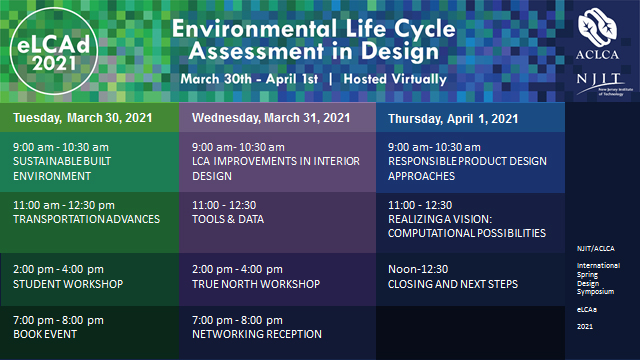Spring Symposium eLCAd: Environmental Life Cycle Assessment in Design March 30- April 1, 2021
Organized and sponsored by the New Jersey Institute of Technology and the American Center for Life Cycle Assessment
Truly sustainable design is increasingly driven by a steady stream of reliable data. What was once a field that relied almost completely on heuristics, sustainable design now leverages computationally guided workflows in conjunction with robust databases. How does this data-driven approach to sustainability liberate design where appearance is now decoupled from substance?
The designer’s primary job is to present compelling synthetic solutions that meet people’s needs. Good design, at every scale, stirs emotions while satisfying multiple utilitarian requirements. At this point in human evolution, however, it is necessary – and possible – to do more. Environmental life cycle assessment (LCA) provides a fact-based scientific approach to evaluate design decisions. It is grounded in a deep understanding of the environmental impacts associated with human-directed natural resource flows and the industrial processes that transform them. Tracking current human impacts on the ecosphere in increasingly detailed ways is critical to reducing and even reversing the negative environmental effects of providing for a global population of nearly 8 billion people.
This inaugural symposium unites these two parallel but separate cultures engaged in dynamic systems thinking. It will explore areas of common cause and mission in two sectors: building and transportation. Through three half days of presentations and working sessions, we will come together to define current and future opportunities brought about through leaps in computational power that promise to augment and improve sustainable design processes at multiple scales.

 Study Architecture
Study Architecture  ProPEL
ProPEL 
